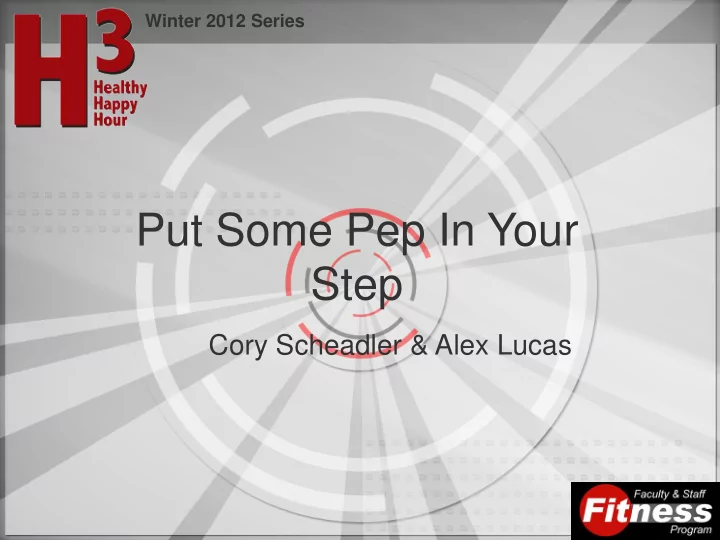

Winter 2012 Series Put Some Pep In Your Step Cory Scheadler & Alex Lucas
Winter 2012 Series What is a Calorie A calorie = Energy contained in a food substance. A single calorie = energy required to temperature of 1g water by 1°C 1 kilocalorie (kcal) = 1 Calorie 1g CHO = 4 kcal 1g Protein = 4 kcal 1g Fat = 9 kcal 1g Alcohol = 7kcal
Winter 2012 Series How Does Your Body Use Calories? Calories = Fuel source = Energy (E) Energy is required to maintain life Basal Metabolic Rate (BMR) - lowest E to sustain life. ≈ Resting Metabolic Rate (RMR) E used at rest. Thermic Effect of Food (TEF)- E required to use food eaten (CHO<Protein) Thermic Effect of Activity (TEA)- E required for activity So BMR+TEF+TEA = daily total
Winter 2012 Series How can understanding Expenditure Intake Calories be of value? TEF PHYSICAL ACTIVITY FOOD BMR
Winter 2012 Series How many Calories? Pancakes – 225 Syrup - 200 Orange Juice – 110 Coffee – 0 Latte - 150 Bagel – 215 Banana – 90 Butter – 100
Reading labels
Winter 2012 Series How many Calories?
Winter 2012 Series Energy cost of activity Moderate intensity exercise = 3.5 – 7 kcal per minute Walking - 3 to 4.5 mph Stationary bicycling General weight lifting Vigorous intensity exercise = >7.5 kcal per minute Race walking - >5mph Jogging or running Stationary bicycling >10mph Circuit weight training
Winter 2012 Series Additional Factors Age – 1 – 2 % per decade (Muscle mass, Hormones) Gender – Females < Males (Muscle mass, Hormones) Exercise Type – Running > Walking Fitness Level – Higher Fitness < Lower Fitness (Efficiency)
Winter 2012 Series Putting it all together Your Energy Requirement 1. Conversions Weight 150 68.2 __________ lbs / 2.2 = __________ kg Height 5 5 65 165 ____‘_____ “ = ______“ * 2.54 = ___________ cm
Winter 2012 Series Putting it all together Your Energy Requirement 2. Resting Metabolic Rate (RMR) If you know your % fat: 0.30 68.2 20.5 ________ * __________ = ___________ %fat weight fat weight 68.2 20.5 47.7 ________ - __________ = ______________ Weight fat weight lean body weight 47.7 1549 Cunningham: RMR = 500 + 22 (_____________) = __________________ kcal Lean body weight RMR
Winter 2012 Series Putting it all together Your Energy Requirement 2. Resting Metabolic Rate (RMR) If you do not know your % fat: Harris-Benedict: Male RMR 68.2 165 30 1627 66.47 + 13.75 (________) + 5 (________) – 6.76 (_______) = ___________ kcal weight height age RMR Female RMR 1472 68.2 165 30 655.1 + 9.56 (________) + 1.85 (_________) – 4.68 (________) = __________ kcal weight height age RMR
Winter 2012 Series Putting it all together Your Energy Requirement 3. Physical Activity Index (PAI) Activity level Male Female Bed Rest 1.2 1.2 Very Sedentary 1.3 1.3 Sedentary/ Maintenance 1.4 1.4 Light 1.5 1.5 Light Moderate 1.7 1.6 Moderate 1.8 1.7 Heavy 2.1 1.8 Very Heavy 2.3 2.0 1.7 PAI workout (PAI-w) days = _________ 1.4 PAI non-workout (PAI-nw) days = __________
Winter 2012 Series Putting it all together Your Energy Requirement 4. Thermal Effect of Food (TEF) 1600 0.05 to 0.10 80 to 160 ____________ * _________________ = _________________ kcal RMR 5-10% TEF
Winter 2012 Series Putting it all together Your Energy Requirement 5. Estimated Energy Requirement (EER) 1600 1.7 120 2840 Workout day: ___________ * _________ + ___________ = _____________ kcal RMR PAI-w TEF EER-w 1600 120 2360 1.4 Non-workout day: ___________ * _______ + __________= _____________ kcal RMR PAI-nw TEF EER-nw
Winter 2012 Series Practical implications Taking in less Calories – Low Fat vs. Low Calorie Expending more calories – Extra day of exercise Incidental PA (stairs, parking further away)
Winter 2012 Series Examples of changing your exercise routine For a person typically exercising 2 x p/week for 1 hour 20 minutes treadmill walking -4 kcal x 20mins = 80 kcal 40 minutes weight lifting -(moderate)5 kcal x 40 = 200 kcal = 280 – 300 kcal per session (approx) = 560 – 600 kcal per week Adding 1 extra workout day or half an hour of walking = 600 + 120 = 720 kcal Or walking faster, or higher grade = 5kcal x 30 = 150 kcal
Winter 2012 Series Examples of changing diet Eating smaller portions – Serving sizes Eating Smaller meals more often (TEF) Applebee’s Choosing lower calorie options choc chip Sundae Treat type foods less often - 1580 kcal
WITH AGING Expenditure Intake-adjust accordingly 2360 TEF - 120 PA - 640 FOOD BMR- 1600
WITH AGING Expenditure Intake-adjust accordingly 2360 TEF - 120 PA - 640 FOOD BMR- 1600
WITH AGING Expenditure Intake-adjust accordingly 2470 TEF - 120 PA - 750 FOOD BMR- 1600
Winter 2012 Series What’s the take home? IT takes effort to count and monitor Energy Balance BUT, Monitoring for a week here and there gives you a good idea of where you can make changes and really helps with managing your energy use! GOOD LUCK!
Winter 2012 Series THANK YOU FOR COMING! We hope you enjoyed this session!
Winter 2012 Series Questions!
Recommend
More recommend